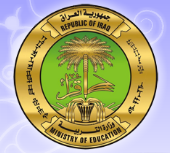Salam Shabab (Peace Youth) began as the first reality television program made to promote the empowerment of Iraqi youth. Filmed and produced in Iraq in partnership with Magic Carpet for Media Production and Steel River Productions, each season of Sala m Shabab followed 54 Iraqi teens from six different provinces as they produced their own short films, performed on stage, and used teamwork to win sport and educational challenges.
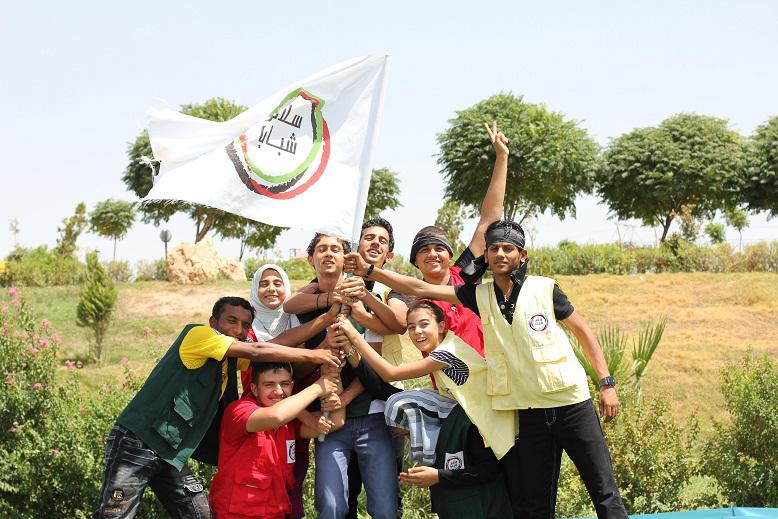
The project developed an active social media presence with huge following from youth across the Middle East. This online community created an environment that empowered youth to use technology to spark peacebuilding in the communities. Whether by providing youth with access to online toolkits that trained them on how to use technology for social good or by fostering a digital space that encouraged them to participate in civil society and share their narratives, Salam Shabab sought to improve knowledge, promote positive attitudes, and shape behaviors to foster effective peacebuilding in local communities across the Middle East.
In 2012, Salam Shabab won the prestigious UNESCO Prize for Intercultural Dialogue at the Prix Jeunesse.
Looking to learn more about Salam Shabab? You can follow the series on Twitter, watch on YouTube or join the community on Facebook.
Featured Publications
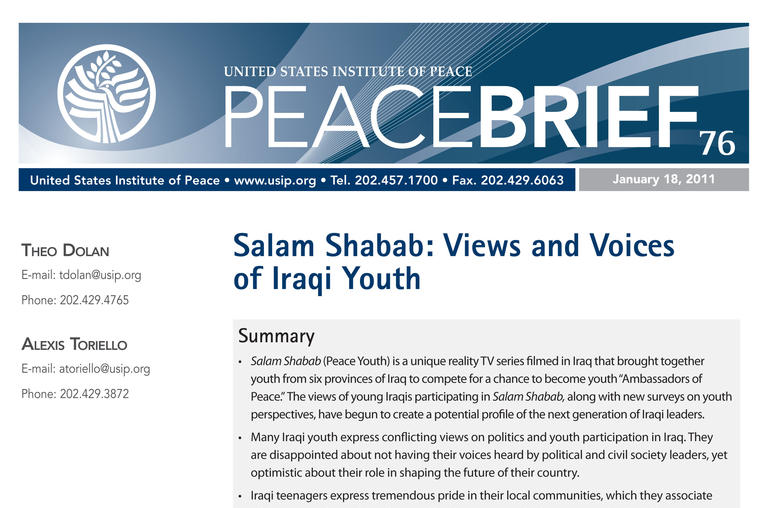
Salam Shabab: Views and Voices of Iraqi Youth
This Piece Brief presents a unique collection of Iraqi youth perspectives based on recent research as well as firsthand views of Iraqi youth participating in the filming of the Salam Shabab (Peace Youth) reality TV series.
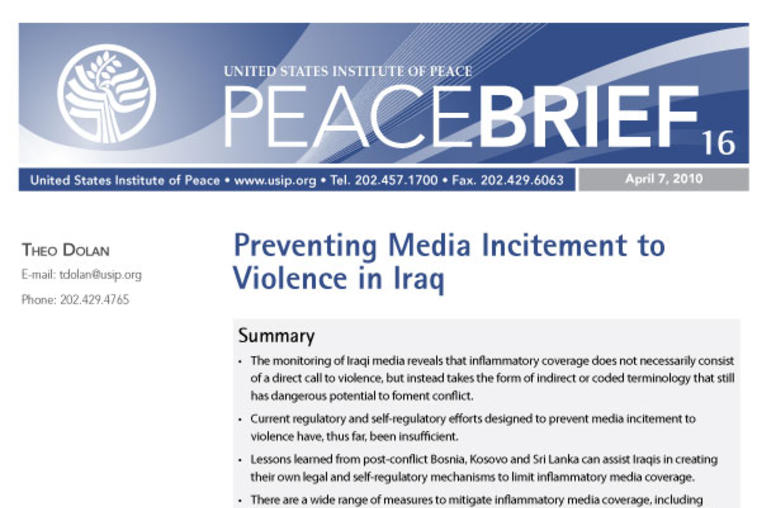
Preventing Media Incitement to Violence in Iraq
Iraqi media stakeholders have identified media incitement to violence as a crucial issue, especially during election periods. As a result, USIP convened a conference on September 25-26, 2009 to explore the complex issue and to identify specific action points for mitigating inflammatory coverage in Iraq. This brief documents the findings of that conference.
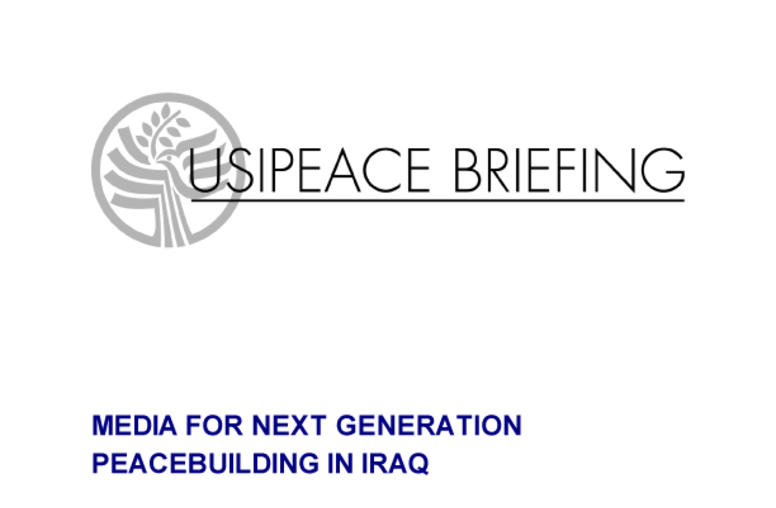
Media for Next Generation Peacebuilding in Iraq
In order to address some of the challenges facing youth in Iraq, USIP and its Iraqi partners created a multimedia program that provides Iraqi teenagers with tools that can help them grow into independent, empowered citizens within a complex society. This report offers an introduction to USIP’s youth media project, a summary of an expert working group and the next steps in developing the program designed to help Iraqi teenagers in becoming active contributors to peace in Iraq.
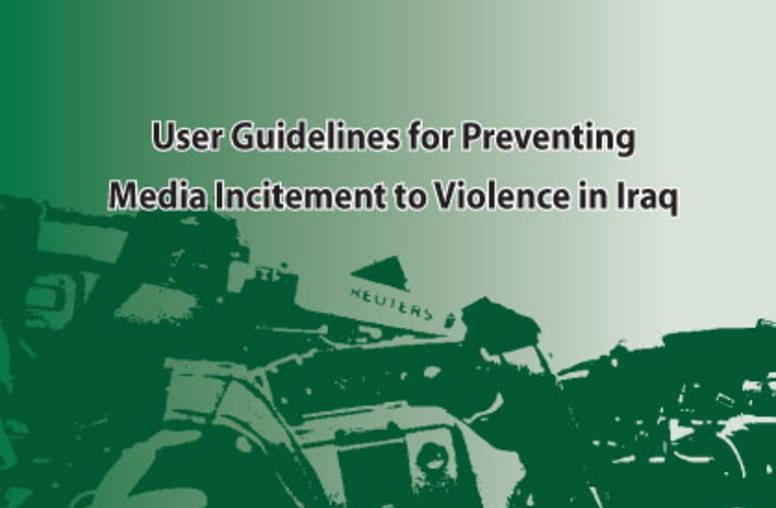
User Guidelines: Preventing Media Incitement to Violence in Iraq - Elections Edition
These guidelines are a resource developed by USIP in collaboration with UNESCO and Iraqi media partners. They are designed as a self-regulatory tool for media to gain awareness about the dangers of inflammatory language in reporting on elections. This Arabic resource, which includes suggested alternatives to facilitate more conflict-sensitive reporting, has been distributed to Iraqi media outlets and government offices prior to Election Day in Iraq.
Past Convenings
Next Generation Peacebuilding and Social Change in the Arab World
On January 25, an event at USIP explored what connects and divides Iraqi youth from others across the region. In addition to a panel of three dynamic young cultural leaders and activists, the afternoon featured an exclusive screening of one episode from Season 1 of Salam Shabab, the first peacebuilding television series for Iraqi youth supported by USIP. A question and answer session with the show's producers followed the screening, and the evening concluded with a live performance by Iraqi pop band UTN1.
Preventing Media Incitement to Violence in Iraq Workshop, Erbil
In December of 2011, USIP held a second Preventing Media Incitement to Violence in Iraq Workshop in Erbil for Iraqi media regulatory bodies, news media and civil society monitoring NGOs. Since a key objective of the workshop was to place ownership of self-regulatory tools into the hands of Iraqi media stakeholders themselves, USIP and expert trainers designed a practical, hands-on training program to instruct participants in content analysis methodology and style guide development for application at their own organizations.
Preventing Media Incitement to Violence in Iraq
This first Preventing Media Incitement to Violence in Iraq Workshop gathered fifteen high-level Iraqi media stakeholders from government, news media and civil society to preview preliminary content analysis results of the top five Iraqi satellite channels’ coverage of the 2010 parliamentary elections. The content analysis was then used as a training tool to teach participants how to conduct their own content analysis. In addition, they collaboratively developed the foundations for a customizable Style Guide for preventing media incitement to violence in Iraq.


